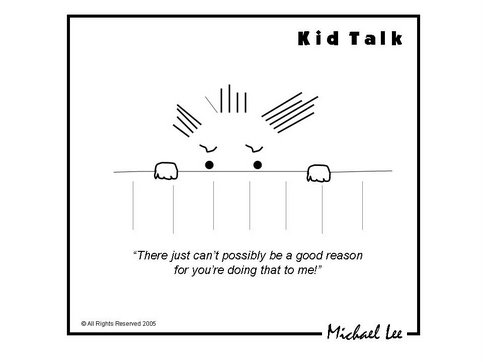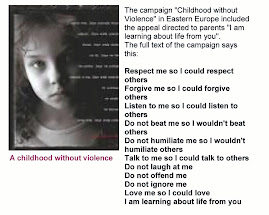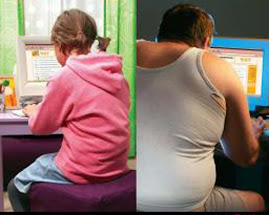

Tuesday, 5 June 2007
2007 06: Register the sex offenders
The Star online. News. Opinion. Friday June 1, 2007
Why not: By RASLAN SHARIF
READING the newspapers can often be a heart-breaking, gut-wrenching experience.
You turn the pages slowly as you go from headline to headline, pausing now and then to read more of stories that pique your interest.
As the final page is flipped, the odds weigh heavily in favour of your feelings at that particular moment being a mixture of anger, disbelief and disgust, rather than joy, trust and admiration.
Journalists are supposed to be a tough lot, hardened by regular exposure to the worst that humankind has to offer, or so some of us would like to think.
But contrary to popular belief and self-delusion, we do have souls, and our hearts bleed as readily as the next person.
At a personal level, very few things hit me as hard as the occurrence of sex crimes perpetrated against women and children.
Because the news is not just a vocation but also an addiction for me, I find myself of late increasingly punch drunk after doing my rounds of the news.
We read of women raped by burglars who break into their homes, children raped or sodomised by the people who are entrusted with looking after them, and teenage girls raped by boyfriends who then pass them around like a joint of ganja to be shared by all.
Early last month, a 28-year-old pregnant woman in Johor was raped by two men who had hijacked the car she and her three-year-old son were in, while just few days ago, a religious teacher was accused of sodomising two 12-year-olds at their hostel.
And there have been many more incidences over the past several months.
It would seem that more and more people in this country think nothing of committing sexual abuse against others, as if the gravity of the offence amounts to little more than that of shoplifting from a supermarket or running a red light.
Convicted rapists in this country could spend decades behind bars and receive several lashings of the rotan, but these very heavy punishments do not seem to have achieved much by way of being a deterrent.
Police statistics compiled by The Women's Centre for Change, a Penang-based non-profit organisation that provides support for victims of sexual abuse, paint a very grim and disturbing picture.
Reported incidences of rape have doubled from a 1,217 cases in 2000 to 2,431 cases in 2006. Incest cases have also been on the rise, with 332 cases reported last year compared with 213 in 2000.
And this is just a tip of the iceberg. It is estimated that nine out of 10 incidences of criminal sexual abuse go unreported.
Which means there are thousands more women and children out there who suffer in silence. And they do suffer, make no mistake.
Rape Trauma Syndrome is an established medical condition that can afflict rape victims and disrupt their lives for years.
It is even worse for child victims. Child sex abuse affects the physical and emotional development of victims long after the incident.
According to the Encyclopaedia of Crime and Punishment, the long-term effects of child sexual abuse include depression, anxiety, post-traumatic stress disorder, sexual dysfunction, and substance abuse.
Some victims were also twice as likely to attempt suicide compared to non-abused children.
And throughout their lives, sexually abused children are “four times more likely to be at risk for developing a psychiatric disorder and are about three times more likely to abuse substances than their non-abused counterparts.”
It is heavy price that sex abuse victims pay, and some continue to pay all their lives.
If the deterrent sentences offer little protection against sex abuse, then it is clear we need to do more.
I believe many would welcome efforts to have a public registry of convicted sex offenders, both those who are in prison and those who have been released after serving their sentences.
As the son of a mother, the husband of a wife, and the father of two children, I definitely would want to know where such people, especially those found guilty of offences against children, live and work.
Some might argue that a person who has served his sentence should not have his past crimes held against him, especially if the person was a first-time offender. And what if he has been truly rehabilitated?
That sounds like a reasonable argument, but when it involves sex crimes, it doesn't sound so reasonable to me.
Why should such criminals be able to lead normal, private lives when many of their victims have to struggle with theirs in coming to terms with what had been done to them?
In any case, it is doubtful that anyone would want family members to be the evidence that the rehabilitation process did not exactly produce the outcome hoped for.
Others might argue that such a registry would do little to protect society from first-time offenders.
Agreed, but we could do more on that front by significantly increasing our efforts, both on individual and official basis, to educate and heighten awareness, especially among children, on the dos and don'ts, and potential dangers to look out for.
Rape is much more than a crime. It is a despicable, cowardly and often a violent act that has little parallel with other types of non-conforming behaviour.
The human rights of the rapist are the last thing that would concern many people, rightly or wrongly.
Star Online editor Raslan Sharif is at heart a liberal, but believes that we have to draw the line somewhere.
Why not: By RASLAN SHARIF
READING the newspapers can often be a heart-breaking, gut-wrenching experience.
You turn the pages slowly as you go from headline to headline, pausing now and then to read more of stories that pique your interest.
As the final page is flipped, the odds weigh heavily in favour of your feelings at that particular moment being a mixture of anger, disbelief and disgust, rather than joy, trust and admiration.
Journalists are supposed to be a tough lot, hardened by regular exposure to the worst that humankind has to offer, or so some of us would like to think.
But contrary to popular belief and self-delusion, we do have souls, and our hearts bleed as readily as the next person.
At a personal level, very few things hit me as hard as the occurrence of sex crimes perpetrated against women and children.
Because the news is not just a vocation but also an addiction for me, I find myself of late increasingly punch drunk after doing my rounds of the news.
We read of women raped by burglars who break into their homes, children raped or sodomised by the people who are entrusted with looking after them, and teenage girls raped by boyfriends who then pass them around like a joint of ganja to be shared by all.
Early last month, a 28-year-old pregnant woman in Johor was raped by two men who had hijacked the car she and her three-year-old son were in, while just few days ago, a religious teacher was accused of sodomising two 12-year-olds at their hostel.
And there have been many more incidences over the past several months.
It would seem that more and more people in this country think nothing of committing sexual abuse against others, as if the gravity of the offence amounts to little more than that of shoplifting from a supermarket or running a red light.
Convicted rapists in this country could spend decades behind bars and receive several lashings of the rotan, but these very heavy punishments do not seem to have achieved much by way of being a deterrent.
Police statistics compiled by The Women's Centre for Change, a Penang-based non-profit organisation that provides support for victims of sexual abuse, paint a very grim and disturbing picture.
Reported incidences of rape have doubled from a 1,217 cases in 2000 to 2,431 cases in 2006. Incest cases have also been on the rise, with 332 cases reported last year compared with 213 in 2000.
And this is just a tip of the iceberg. It is estimated that nine out of 10 incidences of criminal sexual abuse go unreported.
Which means there are thousands more women and children out there who suffer in silence. And they do suffer, make no mistake.
Rape Trauma Syndrome is an established medical condition that can afflict rape victims and disrupt their lives for years.
It is even worse for child victims. Child sex abuse affects the physical and emotional development of victims long after the incident.
According to the Encyclopaedia of Crime and Punishment, the long-term effects of child sexual abuse include depression, anxiety, post-traumatic stress disorder, sexual dysfunction, and substance abuse.
Some victims were also twice as likely to attempt suicide compared to non-abused children.
And throughout their lives, sexually abused children are “four times more likely to be at risk for developing a psychiatric disorder and are about three times more likely to abuse substances than their non-abused counterparts.”
It is heavy price that sex abuse victims pay, and some continue to pay all their lives.
If the deterrent sentences offer little protection against sex abuse, then it is clear we need to do more.
I believe many would welcome efforts to have a public registry of convicted sex offenders, both those who are in prison and those who have been released after serving their sentences.
As the son of a mother, the husband of a wife, and the father of two children, I definitely would want to know where such people, especially those found guilty of offences against children, live and work.
Some might argue that a person who has served his sentence should not have his past crimes held against him, especially if the person was a first-time offender. And what if he has been truly rehabilitated?
That sounds like a reasonable argument, but when it involves sex crimes, it doesn't sound so reasonable to me.
Why should such criminals be able to lead normal, private lives when many of their victims have to struggle with theirs in coming to terms with what had been done to them?
In any case, it is doubtful that anyone would want family members to be the evidence that the rehabilitation process did not exactly produce the outcome hoped for.
Others might argue that such a registry would do little to protect society from first-time offenders.
Agreed, but we could do more on that front by significantly increasing our efforts, both on individual and official basis, to educate and heighten awareness, especially among children, on the dos and don'ts, and potential dangers to look out for.
Rape is much more than a crime. It is a despicable, cowardly and often a violent act that has little parallel with other types of non-conforming behaviour.
The human rights of the rapist are the last thing that would concern many people, rightly or wrongly.
Star Online editor Raslan Sharif is at heart a liberal, but believes that we have to draw the line somewhere.
Subscribe to:
Post Comments (Atom)



No comments:
Post a Comment